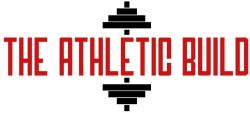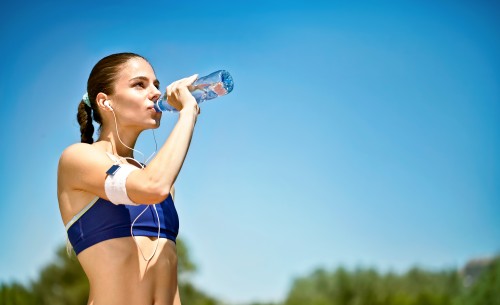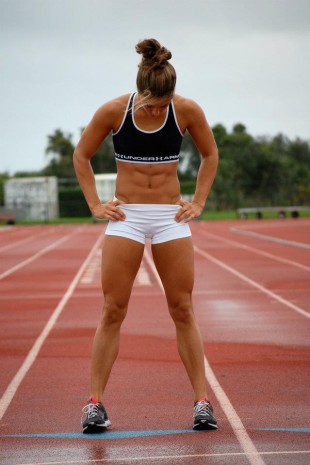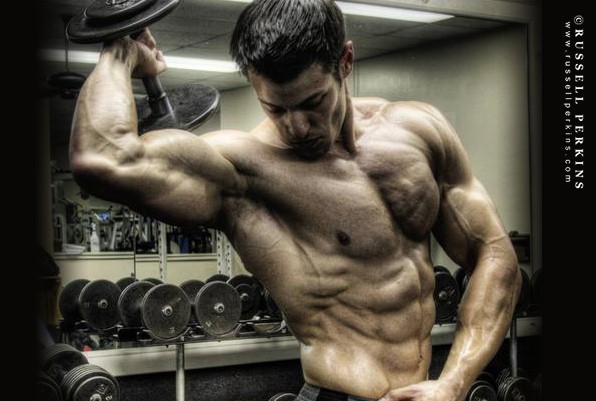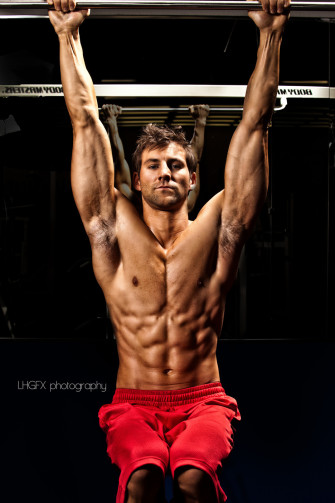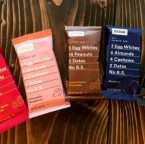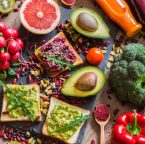As an athlete, it’s important to have the right fuel for your body.
Eating the wrong foods can be detrimental, and may even lead to injuries or worse.
In this article, we’re going to talk about how you can make sure that your diet is as healthy as possible so that you don’t compromise your performance on the field.
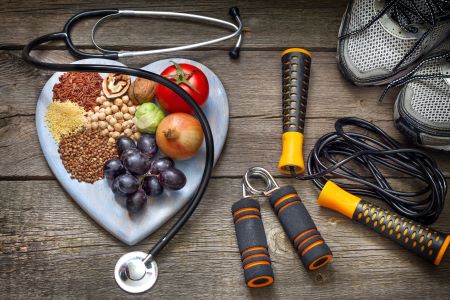
The Basics of Macronutrients for Athlete Nutrition
The first thing that you need to know is what macronutrients are.
Macronutrients are the three main nutrients in food: proteins, carbohydrates, and fats. Each of these has its own benefits for your body as an athlete.
Sometimes one or more will even be recommended over another depending on what kind of activity you’re doing; for example, if you’re a marathon runner, more of your calories may come from carbohydrates than proteins.
Let’s break down each of these macronutrients for you.
Related: How to Count Your Macros and Why You Should
Get Your Carbs
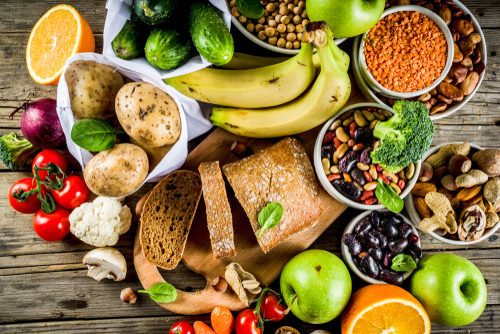
We’ll start with carbohydrates. Carbohydrates are an important part of your diet because they’re the main source of energy for athletes.
If you want to maintain top performance, it’s especially important that you know how much carbohydrate is appropriate to eat every day. For example, if you play a soccer game in 90-degree weather and expect to play for two hours, you’re going to need about 500g of carbohydrates.
If your game is in the evening when it’s cooler, then that amount will be closer to 350-400 g per day. If you’re planning to play for 90 minutes, then it’s okay if your daily intake is closer to 300 g.
What carbohydrate foods should athletes avoid?
Athletes need to make sure they don’t eat too many simple carbs because those will cause blood sugar levels to rise quickly. If you eat too many simple carbs, then that will cause your energy level to drop, and it may even take a toll on your mental performance because carbohydrates are the main source of fuel for your brain.
Although athletes need carbohydrates in their diet, they should also avoid sugary foods like candy bars or soda. If you do eat sugary foods, then it’s best to make sure they’re eaten in moderation. Also, avoid foods that are high in saturated fat because those will cause weight gain and blood pressure levels to rise.
Good sources of carbohydrates include:
- Fruits
- Vegetables
- Whole grains
- Oatmeal
- Brown rice
- Beans
- Bulger
Get Your Protein
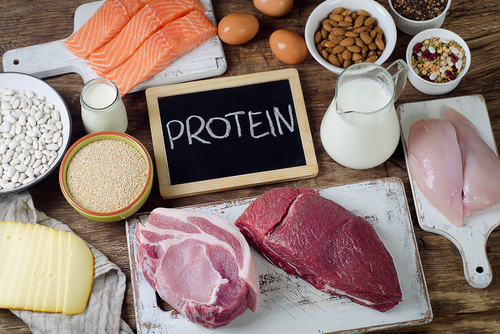
Protein is another important nutrient for athletes. Protein helps your muscles rebuild and repair after an intense workout, which will allow you to perform better in the future.
What foods should athletes avoid eating? Athletes need to make sure they don’t eat too many high-fat proteins like sausage or bacon because those are very unhealthy and may even cause weight gain.
It’s also important to avoid oily fish like salmon because they contain high levels of mercury, which can affect the brain and nervous system if consumed too frequently.
Protein foods that are safe for athletes include:
- Lean meats
- Lentils
- Peas
- Egg whites
- Tuna
- Greek yogurt
- Low-fat cottage cheese
- Salmon
How much protein should you eat?
I recommend eating .8- 1g per lb of bodyweight and can jump as high as 1.25-1.5 grams per pound when in a larger deficit. For a 200lb athlete, that would be between 160-200g of protein.
Eat More Protein! – Your body needs it!
Related: The 15 Best Protein Bars on the Market
Related: Should Athletes Take Pre-Workout Supplements Before Games?
Eat Healthy Fats
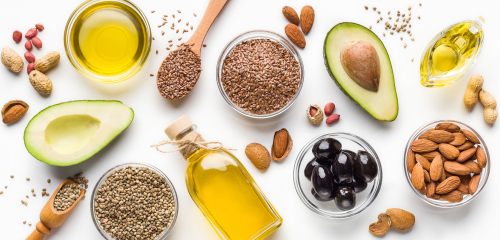
Athletes also need to make sure they’re eating healthy fats in their diet because those will help with energy levels and mental focus as well as helping your body absorb fat-soluble vitamins like A, D & E.
An athlete’s diet should include 20% of calories from healthy fats, which comes out to be about 44-65g in a 2000 calorie diet.
There are three different types of fats: saturated, monounsaturated and polyunsaturated. Saturated fat is the type that causes blood pressure levels to rise quickly. If you want to make sure your diet contains healthy oils, then it’s best if they’re in the form of mono- or polyunsaturates.
Fats that are good for athletes include:
- Olive oil
- Avocado
- Canola oil
- Salmon
- Hazelnuts
- Pumpkin seeds
- Peanut butter
- Lake Trout
Athletes should avoid foods like cheese or fried food because those contain saturated fat.
Fats are more calorie-dense than carbohydrates or proteins, so if you eat too many, it may cause you to gain weight.
Micronutrients for Athletes
Let’s not forget about the micronutrients. Athletes should make sure they’re getting enough vitamins and minerals in their diets because that will help them perform better at practice or during games.
Some micronutrients that athletes need include: iron for red blood cell production, calcium to strengthen bones and teeth along with vitamin D which helps improve bone formation, magnesium is important too as it can reduce muscle cramps by improving nerve conduction while potassium helps the heart contract efficiently.
All of these nutrients are found through a healthy diet but an athlete might also choose to take supplements after consulting with a doctor first about what’s best for their needs.
Related: Student-Athlete Nutrition: Keep Your Competitive Edge
7 Nutrition Rules For Athletes To Follow
1. Eat 3-5 times per day
This can be 3 meals and 2 snacks or 5 smaller meals or 4 meals and 1 snack. The key is going to be finding a meal frequency that is easiest to fit with your lifestyle.
2. Eat every 2-4 hours
This will keep your body fueled throughout the day with more consistent energy. This is also the best way to prevent overeating and binging.
Choose a meal frequency that fits your lifestyle and one that you can stick to. Don’t spread them out too far if you get so starving and want to eat everything.
3. Drink lots of water
Even more than what you’re thinking. Staying hydrated is important to keep your body running properly. It helps prevent injuries and decreases joint pain and inflammation.
4. When in doubt eat protein and veggies
Remember from the section above how important protein is?
I don’t want to repeat myself, but it’s very important. If you aren’t sure what to eat you can go wrong with a protein and veggie meal, especially if you want to lose fat.
5. Don’t eat foods that make you feel crappy (even if it’s supposed to be good for you)
Just because someone says a food is ‘healthy’ it does not mean it is the best for you.
If your trainer says to eat a banana and have a protein shake before your workout but you always feel like you are going to puke. Get a new trainer and a new pre-workout meal.
6. Eat your carbs around your workouts
Play around with the size, different ratios of protein, carb and fat, and how far away from your workout you eat.
I recommend eating 45 minutes to 2 hours before your workout, depending on the size of the meal/snack.
Play with this and see where you feel best.
You’ll hear people say 1-3 hours, but I’m always starving mid-workout if I do 3 hours and sometimes I’m in a crunch and a small snack is good at 45 minutes.
The size of the meal and type of food will be the biggest determining factor.
7. Have protein shakes when you can’t get to real food.
In most cases, it’s better to eat real food as opposed to supplementing with a protein shake.
If you are in a crunch and can’t get food or eat, make sure you take a high-quality protein.
Do not random junk that Tommy Two Guns is selling at the local supplement store.
Do your research and make sure the company is regulated and pays to have their products tested.
Portion Sizes and Calories
When it comes to portion sizes, athletes need the right amount of food so they have enough energy during practice or a game. If you eat too much, then that will cause weight gain and may lead to fatigue.
On the other hand, if you don’t eat enough calories each day before an event, then your performance will suffer because your body will not have enough energy to perform at its best.
Athletes need to make sure they eat about 30% more calories than their sedentary counterparts because athletes burn so much energy when performing physical activity.
Also, if you’re an athlete who competes in a sport that requires weight classes like wrestling or boxing, then it’s important that you do not gain weight because you risk not making weight and losing your spot on the team.
Athletes need to make sure they eat enough food each day so that their body has enough energy during practice or a game.
For example, if an athlete weighs 200 lbs and plays college football then he needs between 4000-6000 calories per day because those athletes burn so much energy when they perform physical activity during practice and games.
Although it’s important not to overeat, athletes also need to make sure they eat often enough throughout the day so that their bodies have plenty of fuel for high-intensity training sessions or games. Eating every few hours will keep you energized and your blood sugar levels balanced.
Cross country runners who don’t eat enough (which is very common) are likely to feel fatigued during their races which will hinder them from performing at optimal levels, don’t let this happen to you.
Related: How to Contol Food Portions and Macros
Stay Hydrated
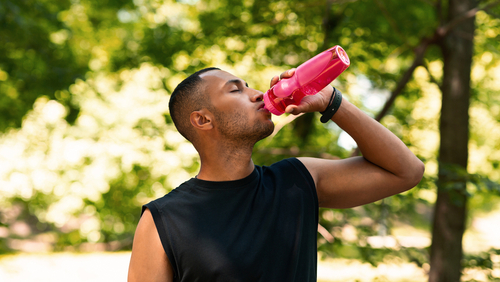
Athletes need to make sure they’re drinking enough water each day. Dehydration can cause fatigue, which leads to poor performances.
Not only that but athletes also need the right balance of electrolytes in their bodies because those are nutrients like sodium and potassium that help with muscle contractions for physical activity. That’s why it’s important for athletes to eat foods that contain electrolytes like bananas, orange juice and pretzels.
When you’re dehydrated your body cannot cool itself down as well during physical activity which causes a rise in core temperature. This can lead to heat-related injuries if an athlete is exposed to hot weather for too long or plays their sport indoors where the temperature is much warmer.
Athletes need to make sure they’re drinking enough water each day so that their bodies have the proper hydration levels which will help them perform at optimal levels when it comes time for practice or a game.
For example, if you weigh 200 lbs and play college football then you should be drinking between 14-18 cups of water each day.
Although athletes need to make sure they’re drinking enough water throughout the day, it’s also important that they don’t drink too much because that can lead to electrolyte imbalances which causes cramping and poor performance.
This is especially important for endurance athletes who sweat a lot during their events like triathletes and long-distance runners.
Limit Alcohol Intake
Alcohol dehydrates the body which can lead to fatigue and poor performance when athletes need their bodies at peak levels. It’s important for an athlete to limit alcohol intake because it has a negative effect on hydration status during physical activity, which is key for optimal athletic performance.
Athletes should make sure they don’t consume more than one drink a day because that can affect performance during practice and games.
Not only does alcohol have a dehydrating effect on an athlete’s body but it also has been shown to decrease testosterone levels in men, which is important for muscle growth and strength gains.
For athletes who are out with their teammates or want to go out with friends after a game or to watch a big sporting event, it’s important for them not to overdo it when they drink.
That means no binge drinking or getting drunk because those things could lead to poor performance the next day during practice and games.
What a Sample Day of Eating Looks Like
Here’s an example of what it looks like to eat every few hours throughout the day.
Breakfast – scrambled eggs with spinach, ½ cup oatmeal and a slice of toast with some fruit on the side (strawberries or bananas).
Snack- yogurt parfait consisting of Greek yogurt mixed with granola cereal, some fruit, flaxseed and honey.
Lunch – turkey sandwich with Swiss cheese on whole-grain bread along with a small salad topped with olive oil vinaigrette dressing.
Snack– apple slices dipped in peanut butter or hummus (if you’re vegetarian) served with carrots or celery sticks.
Dinner – grilled salmon, mashed sweet potatoes with a side of green beans.
Snack– protein shake made out of one scoop whey protein powder mixed with fruit juice or water.
The Importance of Recovery Nutrition for Athletes
Recovery nutrition is important because it helps the body refuel and recover after physical activity so that an athlete can get back to training quickly.
This means having a recovery shake or smoothie within 30 minutes after practice, maybe an hour before bedtime and sometimes both depending on how long the athlete has to rest between practices.
Post Game Review
There’s a lot that goes into proper nutrition for athletes and it can be overwhelming to know where to start. However, if an athlete doesn’t have the proper fuel in their body then they won’t perform as well during practice or games which will affect how much playing time they get from their coaches.
This is why it’s important for every athlete to know the basics of proper nutrition for athletes so that they can make sure their bodies are getting all of the nutrients and fuel they need.

Ryan is a former college wrestler and lifelong fitness fanatic with over 25 years in the industry. He’s run half marathons, tackled mud runs, placed in body transformation contests, and coached everything from wrestling to girls’ soccer.
Along the way, he’s tested hundreds of supplements and built a deep well of supplement knowledge. His work has appeared in Muscle & Strength, Testosterone Junkie, The Sport Review, and more. Today, he’s the editor-in-chief of this site, still training hard and helping others reach their goals. Connect with him on LinkedIn below.
